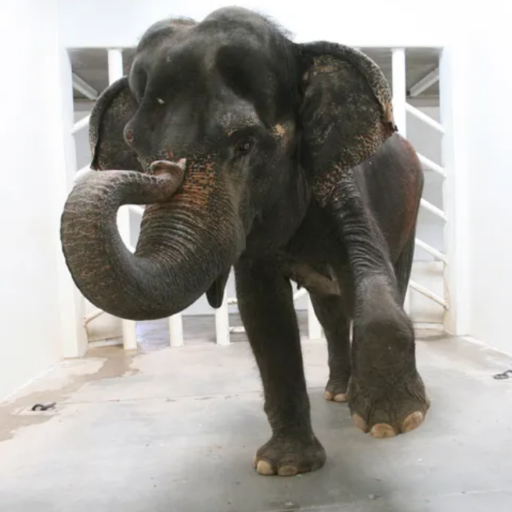
Savannah (Deceased)
El Paso Zoo (El Paso, TX)
Savannah was a 71-year-old Asian elephant who had been confined at the El Paso Zoo from 1997 until her death on January 30, 2024. She spent nearly seven decades held captive in tiny, unnatural enclosures, deprived of everything she would have experienced had she been allowed to live freely with her familial herd in India. For the last three years of her life, Savannah was held alone with no elephant companions and suffered from the zoos’ lack of sufficient space.
Savannah's Story
Savannah spent almost 98 percent of her 71 years of life held captive in tiny, unnatural enclosures, deprived of everything she would have experienced had she been allowed to live freely with her familial herd in India. When she died in January 2024, she was being held alone in a tiny, barren exhibit at the El Paso Zoo in Texas. At the time of her death, Savannah was the oldest Asian elephant in the United States and the longest held captive. There are surprisingly little available records of Savannah’s life story.
Born in India around 1952, Savannah was captured and imported to the United States in 1954. For 27 years, from 1954 until 1981, she was held captive at the Dallas Zoo. Grainy footage of the elephants there, possibly of Savannah, shows an exhibit that looks remarkably similar to the elephant exhibits that exist in present day AZA-accredited zoos. In 1981, Savannah was moved to the Baton Rouge Zoo where she was confined until her transfer to the El Paso Zoo.
For the last 27 years of her life, Savannah was held captive at the El Paso Zoo, which has been named one of the worst zoos for elephants in North America multiple times. An elephant keeper was recorded beating an elephant named Sissy in 1999, resulting in Sissy’s transfer to an elephant sanctuary. This happened while Savannah was at the zoo. In 2005, advocates and elephant experts around the world strongly urged the zoo to transfer Savannah and the zoo’s other elephant, Juno, to an elephant sanctuary, citing the zoo’s inability to meet the elephants’ complex physical and psychological needs (Juno was euthanized in 2021 after battling cancer). The El Paso City Council, which has oversight of the municipally owned and operated zoo, declined to relocate the elephants and only committed to providing them with a nominal amount of additional space.
At the El Paso Zoo, Savannah had access to less than an acre of land, including a barn–unlike an elephant sanctuary where elephants have significantly more space and social opportunities. Prior to her death, Savannah was being treated for early-stage cancer, suffered from arthritis, and had been observed engaging in stereotypies– behavior indicative of brain dysregulation and stress. The zoo subjected her to gimmicky acts, such as having her “choose” which football team will win the Super Bowl (an activity her keepers claim is physical and mental enrichment for her). In a telling example of the zoo’s lack of seriousness with meeting Savannah’s complex needs, the El Paso Zoo Director, Joe Montisano, claims Savannah was happy because she liked to watch television.
The AZA justifies holding elephants like Savannah captive by contending that captivity aids in the conservation of their species. However, allowing wild elephants to remain free and have their own offspring, thereby increasing the wild population, would actually serve conservation efforts. The dubious rationale of conservation cannot justify the lifetime of subjugation, deprivation, and prolonged suffering that Savannah endured.
Savannah was euthanized on January 30, 2024 at the El Paso Zoo. Confining an elephant for over seven decades is an unjustifiable wrong and it is time for the AZA’s elephant program to end.
Take action today
A future where no elephant has to endure the traumas of being torn from their families and natural habitats, bred against their will, and shipped from zoo to zoo is possible, and we need your help to make it a reality.
Submit Information
Do you have a tip for us? The Free to be Elephants project relies on our supporters to keep us up-to-date with the latest news, updates and photos about elephants in their local facilities. Use this form to submit your info and help us expose the reality of elephant captivity across America.